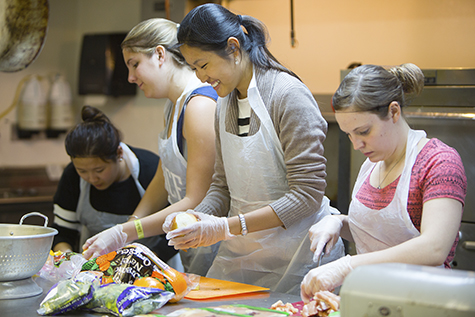Wearing hairnets and latex gloves, six Campus Kitchen volunteers gather in the basement kitchen of First Congregational Church. They have two hours to prepare lunch for 40 homeless women. In the refrigerator, they find frozen chicken, raw veggies, loaves of bread and an assortment of apples.
“We never know what we’re going to get,” said Washington University in St. Louis freshman Nick Fierro. “We just MacGyver it.”
Fierro cracked open a well-worn Better Homes and Gardens cookbook and started coring the apples for apple muffins.
“A Campus Kitchen favorite,” he said, as he searched for a whisk.
Meanwhile, sophomore John Dagger started cutting chicken for a stir-fry, and freshman Anish Kanesa-Thasan sliced loaves of sourdough for garlic bread.
“It’s like a really fun episode of ‘Chopped,’” Kanesa-Thasan said. “Only we are doing something that’s helping people, too.”
The students are among the more than 275 volunteers for Campus Kitchen. Some pick up donated food from Trader Joe’s and Bon Appétit; others deliver and serve the meals. But this crew likes working in the kitchen.

Founded in 2001, the Campus Kitchen Project now has chapters at 32 campuses. Nationwide volunteers have recovered some 3.3 million pounds of food and served some 2.1 million meals. Last year, WUSTL’s chapter served 2,250 meals to its three partner organizations: Our Lady’s Inn, a home for pregnant women and their children; Shalom House, a homeless shelter for women with mental illness; and the Alberti Program, an architecture workshop for St. Louis students.
The program could not exist without the support of Operation Food Search, a local leader in hunger relief. Today through April 15, students, faculty and staff can support Operation Food Search by donating food, toiletries and funds to PB&Joy, WUSTL’s fourth annual food drive. There are 67 drop-off locations at the Danforth, North, West and Medical campuses. Employees and students are asked to donate nutritious, kid-friendly foods such as oatmeal and raisins. For a complete list of recommended items, visit here.
Five ways to support PB&Joy
• Donate to Operation Food Search online here
• Get your group together and pick just ONE thing to purchase and donate, i.e. oatmeal!
• Check out kid backpacks from the Community Service Office as an easy way to remember to fill a bag
• Start a simple competition between your peers or colleagues
• Learn more about childhood hunger and ways to help beyond PB&Joy
LuAnn Oros, community consultant on hunger and homelessness in the Community Service Office, said Operation Food Search is more than a food bank. It offers nutrition and culinary education classes, helps schools and day care centers establish breakfast and after-school meal programs and delivers some 3,500 food-filled backpacks to school children every Friday so they won’t go hungry during the weekend.
“Operation Food Search understands that eradicating hunger won’t happen only with emergency food distribution through food pantries or community meal programs,” Oros said. “They understand that education about food sources, teaching our children and young families how to prepare nutritious food from raw ingredients and providing realistic approaches to procuring groceries and planning menus is really the key.”
The demand is great, Dagger said. He said Campus Kitchen wants to expand operations and currently is raising money for another refrigerator.
“There is always a need for more food and more help,” Dagger said. “That’s easy to forget when you are on a college campus, but there is hunger all around us.”
When PB&Joy debuted four years ago, the nation was in the grips of a recession. The economy has rebounded, but not for everyone, said Stephanie Kurtzman, director of the Community Service Office and associate director of the Gephardt Institute for Public Service.
“Even outside of a recession, far too many children go to bed hungry and try to learn on an empty stomach,” Kurtzman said. “The face of hunger is changing, and the effects of the recession are now reaching middle-class and suburban homes facing the difficult choices between medicine, utility bills and mortgage or rent. The flexible expense is often food, leaving families with the wrenching decision to enter food insecurity and seek outside assistance.”
.